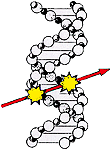


THE EFFECTS OF ALPHA-PARTICLES ON CHROMOSOMAL ALTERATIONS.
Professor Wolfgang Köhnlein, Universität Münster/Germany
Alpha particles, emmitted from radon, uranium and the transuranic elements, is considered
densely ionizing radiation with high biological efficiency.
Until the mid 1980s, alpha irradiation was considered to be about 10 times as damaging as gamma radiation. Only then, with new experimental evidence introduced, did the ICRP raise the value of the relative biological effectiveness (RBE) for alpha-particles to 20 on account of new experimental evidence.
Until recently it was the prevailing opinion that alpha-particles produce preferentially multiple damaged sites, which can not be handled by the repair systems of the cell and will lead to cell death.
In recent years several papers were published showing that the alpha particles do have a considerable mutagenic action and are therefore more dangerous than has long been thought. In experiments with stem cells of the blood forming system in mice exposed to very few alpha-particles Kahdim and co-workers (1) observed in the descendents of these exposed cells an increased number of chromosomal aberrations. From there it can be concluded that single surviving stem cells can transmit some chromosomal instability to their descendents, that finally leads after as many as 10-18 cell divisions to a variety of visible cytogentic aberrations or chromosomal damage.
In a further investigation this time using bone marrow stem cells of haematologically normal individuals, the authors found after alpha-particle doses equal to 0.5, 1 or 2 hits per cell, respectively, non-clonal cytogenetic aberrations characterised by a high frequency of chromatid aberrations in the clonal descendents of the exposed cells(2). Thus they have, confirmed earlier experiments and shown that alpha-particles can induce chromosomal instabilities in human bone marrow stem cells as well.
Since chromosomal instabilities and the development of leukemia are causally related, as is known from the observation of patients with the inherited disease Franconiais anemia, it can be concluded that alpha-particles induced chromosomal alterations in haemapoetic stem cells can contribute to a subsequent development of leukemia.
It is known that persons with similar chromosomal instabilities have a higher and earlier disposition for cancer(3). The defects seen after alpha-irradiation differ clearly from the stable somatic mutations induced by X-and gamma-rays. The latter are clonal and transferred identically to their progeny.
Nagasawa and Little have noticed that alpha-particles already a doses as low as 0,3 mGy leads to significant increase in frequency of sister chromatid exchanges in Chinese Hamster ovary cells exposed in the G1-phase of the cell cycle (4).
To cause a similar increase in the number of exchanges with X-rays a dose of 2 Gy was required. This means for the endpoint considered that alpha-particles have extremely high biological effectiveness in producing genetic damage. The relative biological effectiveness (RBE) rises to about 6000.
If the observation of Kahdim et al. and Nagasawa et al. can be confirmed, then the cancer inducing action of alpha-particles, as emitted by radon and plutonium, is much higher than the estimations based on RBE-values, deduced from the survival curves, would suggest.
In the regulation of permissible doses of alpha-particle emitters like radon and plutonium and in design and interpretation of epidemiological studies of exposed populations, such as uranium miners and nuclear workers, these latest findings must be taken into account.
References
(1) Kadim MA, Macdonald DA, Goodhead DT, Lorimore SA, Marsden SJ, Wright EG (1992), Transmission of chromosomal instability after plutonium (alpha)-particle irradation, Nature 355: No. 6362, 738-780.
(2) Kadhim MA, Lorimore SA, Hepburn MD, Goodhead DT, Buckle VJ, Wright EG (1994), Alpha-particle-induced chromosomal instability in human bone marrow cells, Lancet 344: 987-988.
(3) Evans HJ (1992), Alpha-particle after effects, Nature 355: No. 6362, 674-675.
(4) Nagasawa H, Little JB (1992), Induction of sister chromatid exchanges by extremely low doses of alpha-particles, Cancer Research 52: 6394-6396.
-
[ HOME |
RADIATION |
CONTACT ]

![[Button]](/images/greendot.jpg)
- If you have enquiries regarding any of the items displayed please contact
- Address: P.O. BOX 206 IVANHOE, VIC. 3079. AUSTRALIA
- Phone:(0417) 374-011 Fax:(613) 9497-2049 Email: belinda@autoray.com.au
- This page last edited 13th July 1997.
- Designed by ARC.NET.AU - WEBCORPS.
- Copyright Wolfgang Kohnlein and Rudi Naussbaum © 1997.







![[Button]](/images/greendot.jpg)
![[Button]](/images/arc.jpg)
![[Button]](/images/leaf.gif)